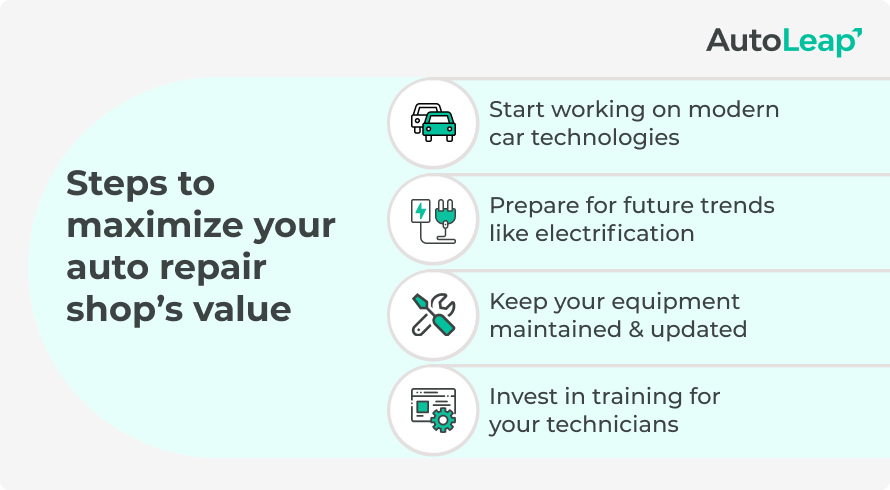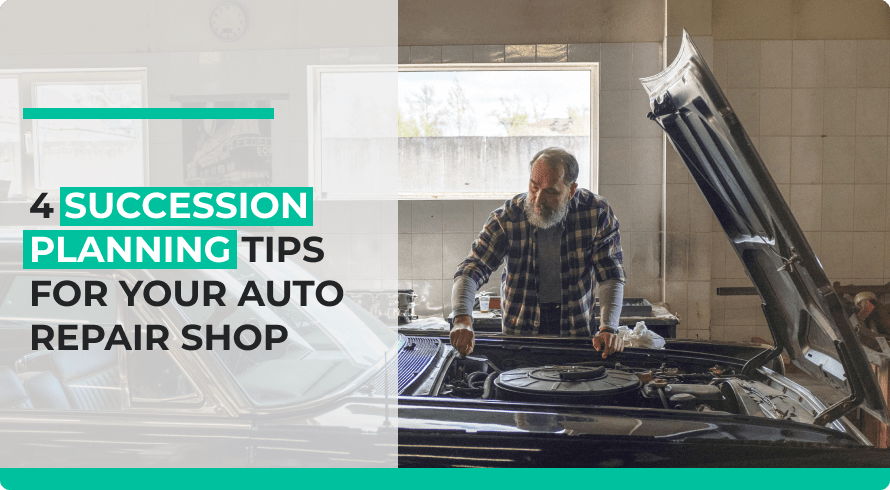For many shop owners, succession planning isn’t a priority. Who wants to talk about retirement? Right now, your shop is the reason you get up in the morning. You’ve invested time and money to make it a success, and every day is full of new challenges and achievements. Why should you be looking that far down the road?
Many shop owners will run into a situation when they simply can’t run their business and must let go to keep it afloat.
In this article, we’ll look at how to create a succession plan, and discuss the importance of having a strategy in place—no matter where you are in your career.
Why create a succession plan?
A succession plan highlights what will happen to a shop once the owner is unable to work. This could happen after the proprietor retires or passes and ensures that your business continues doing what you started.
Only 20–30% of family-owned businesses make it to the second generation according to the Exit Planning Institute.
You’ve worked hard to start an automotive repair shop, so it’s natural to want to see it thrive. All the values and hard work you put into building your shop ends with you without proper succession planning. While some people pass their shops to family members, there still needs to be a system to ensure a smooth transition.
Additionally, if your shop is sold to a third party or restructured, non-technical employees may have a hard time finding new jobs.
How to create a succession plan for an auto repair shop
Creating a succession plan may need some work, depending on your shop’s financial performance. Here are some things you need to know to plan the next steps.
1. Know your shop's worth
You already know you run a tight shop, but what is its value? Nearly 70% of business owners have a vague idea of what their business is worth but can’t state an actual figure. Here’s how to determine your shop’s worth:
Step 1 – Use a business valuation calculator: If you have no idea of what your shop is worth, use a business valuation calculator. This gives you a ballpark estimate using metrics such as:
- Revenue
- Cost of sales
- Overhead expenses
Step 2 – Consult a financial professional: Sit down with an accountant or financial advisor, and work with them to appraise your shop. Get your books in order, with clean balance sheets and statements. Depending on certain variables, selling your shop may not be enough to afford you a comfortable life after retirement so adding value to your business might help.
Step 3 – Add value to your business: If you’re dissatisfied with your business’s current value, there are ways to improve it.
- Add more services: With new technologies like advanced driver assistance systems (ADAS) taking over, shops that specialize in the latest technology will yield higher value.
- Acquire shops and expand: At some point, you’ll want to grow your auto repair business. The more shops you have in your business, the more money you’ll generate. However, it’s important to carefully analyze every expansion opportunity to reduce your financial risk. Consider using automotive repair shop software to sell more and accumulate capital for acquiring other businesses.
- Future-proof your shop: It’s almost inevitable that electric vehicles will become commonplace. Prepare your shop for the electrification of vehicles to attract investors and high-profile buyers. Additionally, preparing for the future ensures that your shop remains relevant for longer.

2. Have the right people in place
You probably already have a great team, but is there a key player who really stands out? There may be a manager, service advisor, or technician who has been with you for a long time and knows your business. Here are a few questions that’ll help you identify if you’ve got the right people who can take charge:
- Does that person understand your processes and business model?
- Are they on a first-name basis with your customers?
- Can they handle business functions like structuring a budget?
- Do they manage conflicts and crisis situations at the shop effectively?
“You have to figure out or predict whether the candidate will be able to make a go of it,” says Eli Melnick, president of Start Auto Forensics Inc. Melnick ran a shop, Start Auto, in downtown Toronto for 40 years, which was founded by his father, Henry.
Once property taxes went sky-high, he sold the shop to a developer. “I had excellent techs, but none of them had the managerial skills to run the place. They could fix cars, but could they deal with suppliers and banks? That’s a whole other story,” he says.
Melnick also cautions about passing the business onto the next generation. “Family businesses rarely last more than two generations,” he states. Although Melnick and his father ran Start Auto successfully, he feels that was the exception, rather than the rule. “Historically, parents and kids don’t get along running a business together.”
3. Start the transition early
There may be a candidate who can fill your shoes once you’ve retired. Choose wisely! You may want to use The Nine-box Talent Grid to evaluate whether an individual can handle the responsibility or requires further training. It measures performance and potential by using a matrix that allows you to make an objective decision.
Once you’ve decided on a candidate, the transition should begin several years in advance of the set date. Your successor may need formal management training and other skill development. They need to learn the finances, marketing, customer relations, and more. Work side by side with them, as you slowly remove yourself from the business. Don’t be afraid to let them make mistakes! You want to test if they can keep their cool during emergencies.
4. Ensure the shop is in good shape
As your retirement date nears, it may be tempting to stop investing in training and shop equipment. But until that day, you have to keep running the business so that it remains profitable. Consider using the following checklist:

Closing thoughts
Like a car, there are many moving parts to a succession plan. One size is not going to fit all, but there are some basic steps that everyone should be taking. You want to ensure you’re prepared for anything from a family emergency to an unexpected illness.
A succession plan will reduce uncertainty for everyone, and ensure the shop you’ve poured so much into will continue to operate. And you should always be on track with clear, consistent financials in case you decide to renovate or expand. Seek out professionals like accountants and lawyers to help you get a good plan in place, so you can sleep easily, knowing your future is secure.








